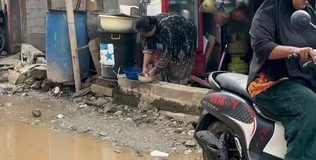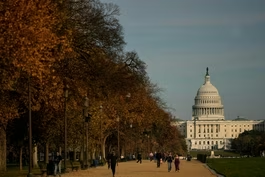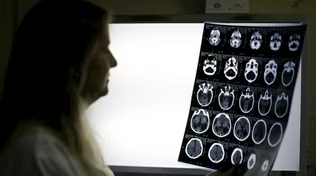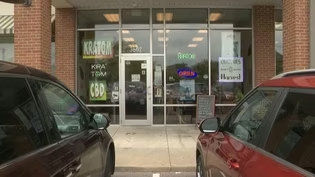
UNICEF: Children face ‘horrific violence’ in Sudan crisis
Clip: 11/9/2025 | 5m 33sVideo has Closed Captions
Children exposed to ‘horrific violence’ in Sudan’s civil war, UNICEF says
Aid groups say tens of thousands of people have fled violence in el-Fasher, a city in the Darfur region of Sudan, which is in the midst of a yearslong civil war. This follows an official declaration that famine is spreading through the northeastern African nation. John Yang speaks with Sheldon Yett, UNICEF’s representative in Sudan, for more.
Problems playing video? | Closed Captioning Feedback
Problems playing video? | Closed Captioning Feedback
Major corporate funding for the PBS News Hour is provided by BDO, BNSF, Consumer Cellular, American Cruise Lines, and Raymond James. Funding for the PBS NewsHour Weekend is provided by...

UNICEF: Children face ‘horrific violence’ in Sudan crisis
Clip: 11/9/2025 | 5m 33sVideo has Closed Captions
Aid groups say tens of thousands of people have fled violence in el-Fasher, a city in the Darfur region of Sudan, which is in the midst of a yearslong civil war. This follows an official declaration that famine is spreading through the northeastern African nation. John Yang speaks with Sheldon Yett, UNICEF’s representative in Sudan, for more.
Problems playing video? | Closed Captioning Feedback
How to Watch PBS News Hour
PBS News Hour is available to stream on pbs.org and the free PBS App, available on iPhone, Apple TV, Android TV, Android smartphones, Amazon Fire TV, Amazon Fire Tablet, Roku, Samsung Smart TV, and Vizio.
Providing Support for PBS.org
Learn Moreabout PBS online sponsorshipIn Sudan, aid group say tens of thousands of people have fled the violence of the city of Al-Fashir and the Darfur region of the northeastern African nation, which is in the midst of a more than two-year civil war.
In makeshift camps, they were counted what they saw this past week, what a paramilitary force captured the city and killed hundreds of people.
MUBARAK, Displace Sudanese Man (through translator): Fifty or 60 people in a single street or 10 or 20 people.
They killed them bang, bang, bang.
Then they would go to the next street and again bang, bang, bang, that's the massacre I saw in front of me.
JOHN YANG: This follows at an official declaration that famine is spreading through Sudan.
Earlier, I spoke with Sheldon Yett, the UNICEF representative in Sudan.
SHELDON YETT, UNICEF Representative in Sudan: I just came back from towns on the outskirts of Al-Fashir, nearby towns.
I talked to a woman who had walked for days and days and days.
This was just before the huge explosion of violence on October 26.
They talked about not knowing where their husbands were, not knowing where their sons were.
They talked about having to eat animal feed, having nothing.
And of course, it was a city that had been under siege for some 600 days.
I had more than one individuals that I was speaking to just break down in tears because they had no idea what had happened, what happened to their children, what happened to the rest of their family.
They had no idea what would happen to them next.
There's this level of anxiety, of fear of knowing that they've been displaced once and fearing that to be displaced yet again as this conflict continues to expand.
JOHN YANG: And tell us what UNICEF is doing on the ground there.
What are your efforts alike?
SHELDON YETT: Now our efforts are really targeted on those people who have managed to survive the massacres that have happened in Al-Fashir.
We've got some 80,000 people who've left the city.
They've gone to various towns in -- around North Darfur.
UNICEF is making sure they're screened for malnutrition, getting access to water and sanitation, giving psychosocial support.
This population has been exposed to huge levels of sexual violence.
Many women have been raped.
These children have been just exposed to the most horrific violence, so lots of psychological scars.
JOHN YANG: And, of course, recently the group that monitors -- the hunger monitoring group, has confirmed famine in parts of Sudan.
What is this exodus of displaced people done to that?
SHELDON YETT: One of the areas that has famine is this area in Al-Fashir.
This is a conflict-induced famine.
No doubt about it.
Sudan is a bread basket.
It's fed much of the Middle East.
But in those areas of conflict, we have famine.
We have people who had nothing and now, of course, have extreme malnutrition.
JOHN YANG: The monitoring group said that they see the famine and the risk of famine in Sudan are only symptoms of a broader deepening crisis.
Is that how you see it as well?
SHELDON YETT: Yes.
I think that's exactly right.
Now -- we're now into two and a half years of this conflict.
And the front lines continue to move.
The number of displaced continues to grow.
There are some 30 million people in this country who need humanitarian assistance, half of them children.
And some 80 percent of children in this country are not in school.
JOHN YANG: You've listed off a number of problems.
Is it possible to say what the top priority should be or what UNICEF's top priority is?
SHELDON YETT: Well, I mean, it depends on where in Sudan.
In those parts of the country, such as Al-Fashir and other parts in North Darfur and the Kordofan, we need to see an end to the violence itself.
We need to make sure that children are safe, that women, that community members, that schools are not being targeted, that people can have a normal life and can feel free to go outside without fear of being shot.
JOHN YANG: What's the latest you're hearing from Al-Fashir and Darfur?
SHELDON YETT: Unfortunately, the instability, the violence is continuing.
The numbers continue to grow.
People are walking for days out of the city to surrounding communities, to host communities.
They're arriving malnourished.
They're arriving dehydrated.
They're arriving on death's door.
We're hearing about many unaccompanied children that must be reunited with their families, or the families are still alive and must get the support they require.
It's what to grow up to be full citizens of their country.
JOHN YANG: There's been such intense global attention on Gaza.
Is there any sense that the attention has been less on Sudan or it's been somehow overshadowed that perhaps the world is focused elsewhere?
SHELDON YETT: Yeah.
I mean, it's not a competition, of course.
But this is the largest humanitarian emergency in the world.
And you wouldn't know it by listening to the world's media.
And I've been doing this work for 30 odd years, and I've never seen anything the scale of what we're seeing in Sudan.
I was in Rwanda.
And I see echoes of what I saw there, patterns of killings that we saw there.
But ultimately, this is a political issue.
This is a -- this is a war.
Humanitarians can only do so much.
And we need the resources to be able to provide the growing levels of need that are affecting children and their families in this country.
JOHN YANG: Sheldon Yett, UNICEF Sudan representative.
Thank you very much.
SHELDON YETT: Thank you.
JOHN YANG: Still to come on "PBS News Weekend," the link between radiation from medical imaging and pediatric cancer.
And why government regulators want to ban a key ingredients in a popular herbal supplement.
How the loss of USAID affects Indonesia’s climate fight
Video has Closed Captions
Clip: 11/9/2025 | 3m 57s | How the loss of USAID funding affects Indonesia’s ability to fight climate change (3m 57s)
News Wrap: Senate works over weekend as shutdown continues
Video has Closed Captions
Clip: 11/9/2025 | 2m 28s | News Wrap: Senate works through weekend as shutdown enters 40th day (2m 28s)
Study suggests risk of pediatric cancer from medical imaging
Video has Closed Captions
Clip: 11/9/2025 | 5m | New study suggests link between medical imaging and pediatric cancer risk (5m)
Why regulators want to ban a key ingredient in kratom drugs
Video has Closed Captions
Clip: 11/9/2025 | 6m 34s | Why regulators want to ban a key ingredient in kratom, a popular herbal supplement (6m 34s)
Providing Support for PBS.org
Learn Moreabout PBS online sponsorship
- News and Public Affairs

FRONTLINE is investigative journalism that questions, explains and changes our world.

- News and Public Affairs

Amanpour and Company features conversations with leaders and decision makers.












Support for PBS provided by:
Major corporate funding for the PBS News Hour is provided by BDO, BNSF, Consumer Cellular, American Cruise Lines, and Raymond James. Funding for the PBS NewsHour Weekend is provided by...



